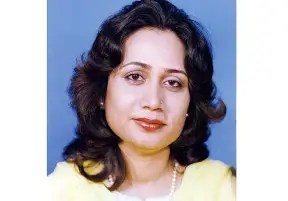Parveen Shakir’s life, as fascinating as her literary contributions, unfolded against the backdrop of societal norms in Karachi, Pakistan. Born in 1952 into a middle-class family, Shakir defied expectations by pursuing education fervently, obtaining a master’s degree in English literature from the University of Karachi, followed by another master’s degree in linguistics.
In 1976, she broke stereotypes by joining the prestigious Civil Service of Pakistan as a customs official, showcasing her dedication and versatility. Her ability to balance bureaucratic responsibilities with poetic endeavors was uncommon, establishing Shakir as a unique figure in Pakistani society.
On the personal front, Shakir’s life was marked by challenges, triumphs, and deep introspection, which permeated her poetry. Experiencing the highs and lows of love, marriage, motherhood, and societal expectations, her verses became deeply relatable. Tragically, Shakir’s life was cut short in 1994 due to a fatal car accident in Islamabad, leaving behind a legacy that continues to inspire.
While her personal life remains subject to speculation, its profound impact on her poetry is undeniable. Parveen Shakir’s genius lies in intertwining personal experiences with broader societal themes, making her a revered figure in both Urdu literature and cultural history.Parveen Shakir’s poetic persona was a captivating blend of innovation, introspection, and rebellion, setting her apart in Urdu literature.
At the core was her audacious approach to traditional forms, particularly the ghazal. While honoring classic conventions, Shakir fearlessly ventured beyond, introducing fresh themes, perspectives, and linguistic nuances. Her choice of words, like ‘khushboo’ (fragrance), and her characterization of the protagonist as a ‘larki’ (girl), showcased her intent to challenge and reshape existing norms.
Shakir’s introspective nature shone through in her verses, delving deep into emotions, experiences, and societal constructs. Her poetry mirrored her personal journey, connecting with audiences on a deeply emotional level. Themes of love, longing, feminism, and societal dynamics were navigated with unparalleled sensitivity and depth.Rebellion marked Shakir’s poetic personality.
In a society bound by patriarchal norms, she fearlessly championed the cause of women, presenting them as empowered individuals capable of introspection, resilience, and transformation. Her portrayal of women transcended stereotypes, depicting them as multifaceted beings with dreams, desires, and aspirations beyond societal confines.In essence, Parveen Shakir’s poetic personality harmoniously blended tradition and modernity, introspection and rebellion, sensitivity, and audacity. Through timeless verses, she enriched Urdu literature, providing a voice to countless individuals—an enduring icon of literary excellence and feminist thought.
Parveen Shakir’s poems form a rich tapestry of emotions, themes, and linguistic elegance, reflecting her unique perspective on love, life, society, and feminism. Here are some aspects and themes often found in her poetic repertoire:
1. **Love and Longing:** Shakir’s portrayal of love is both passionate and nuanced, capturing the myriad emotions associated with love, from exhilarating highs to profound depths of longing and loss.
2. Feminism: A trailblazer, Shakir’s poems challenge societal norms and patriarchal structures, championing women’s rights, aspirations, and complexities beyond stereotypes.
3. Social Commentary: Shakir’s keen eye for societal dynamics mirrors prevailing socio-cultural milieus, addressing societal expectations, gender roles, and broader issues with authenticity and insight.
4. Introspection: Many poems reflect a deep sense of introspection and self-awareness, exploring themes of identity, self-discovery, and personal growth
5. Innovative Approach: Shakir’s innovative approach to traditional forms like the ghazal sets her apart. Contemporary language, themes, and references add a fresh, modern twist, making her work accessible and relatable.
Notable poems include “Khushboo,” “Sad-barg,” “Mah-e-Tamam,” and “Bazm-e-Qayamat,” each encapsulating distinct themes, emotions, or perspectives. In conclusion, Parveen Shakir stands as a luminous figure in Urdu literature, leaving an indelible mark with her innovative style, profound insights, and fearless exploration of themes. Through her groundbreaking poems, she challenged conventions, championed women’s rights, and redefined traditional Urdu poetry boundaries. Shakir’s enduring legacy lies not only in her poetic prowess but also in her ability to resonate with audiences, making her a timeless icon inspiring thought and emotion. Her poetic personality, marked by introspection, rebellion, and linguistic elegance, ensures that Parveen Shakir remains a revered figure, celebrated for contributions to Urdu literature and feminist discourse.




